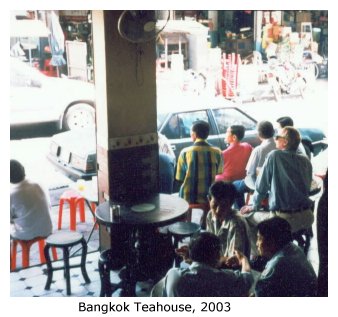Exiting the U.S.A.
A number of readers have expressed interest in exiting the U.S. as a means of avoiding the coming meltdown of The American Dream. Here is the view of one American who moved to New Zealand in 2001. Free eBook just posted: HTML version: Survival+: Structuring Prosperity for Yourself and the Nation (PDF version (111 pages): Survival+) Life is good, but different. Not just in Central America, but anywhere new, even in America. (I could ask Don E. to describe the culture shock of moving to Maine, and I can report that Hawaii is very different from the U.S. mainland. Iowa is different from California which is different from Texas and so on.) This photo is of the bakery in the village where my brother lives in the south of France. He has lived abroad, in India and France, for several decades. France remains very popular with that class of Americans who hanker to restore a crumbling chateau--and there remains any number of majestically crumbling chateaus awaiting your ambitions (and millions). But it is best to set aside the fantasy-invoking idyllic books and understand France (and every region therein) is not at all like the U.S. This appears obvious but the differences keep revealing themselves the longer one lives there. On the other hand, many expats cannot imagine ever returning the land of their birth, especially if they have married into another culture and language as well as another family. There are places I could live for an extended time--Paris, Bangkok, Kyoto, Suzhou, to name a few--but to "move away" from the U.S.--no, I cannot. I find myself sympathizing with the Robert Redford character in Joubert (a free-lance assassin/contractor): "A pity." Redford: "I don't think so." However, life is an adventure and being an expat has great rewards for those up to the challenge. Here is Michael Reps' commentary on moving to New Zealand, a nation high on many lists as a locale which seems likely to escape the brunt of a Peak Oil/Peak Credit/Peak Everything meltdown. Pssst…Hey you…Yes you……Over here…Shhhh..Be very very quiet, and don’t tell any one, but democracy and capitalism are alive and well. You may not know this but freedom is a human precept, not an American one, and it doesn’t go away the minute you leave American Soil. I came across Charles Smith’s site during a Google search for the topic “Leaving the USA”. I noticed the absence of advertisements for ammunition reload kits and raccoon jerky recipes for the coming Armageddon so thought to myself, perhaps I won't get flamed for sounding pro-New Zealand with my views about leaving the USA. On that note let me give you a little background on myself. I do, in fact, know how to reload ammo and make jerky meat, I learned it while a paratrooper in the 82nd Airborne and again as a Captain in the USMC. I was born and raised in California where I spent my formative years brow beaten by Catholic Nuns with thick ankles and short fuses in the mid-Wilshire area of Los Angeles. My formal education is a degree in philosophy from Claremont McKenna College. After the Marines I spent the next 15 years involved in the financial markets where I surmised that the US was heading for a cliffdive economically which ultimately led to me emigrating to New Zealand in July, 2001. Borrowing money to pay for borrowed money simply doesn’t work unless you can import new borrowers at a greater rate than the debt being created. Now, Just as you see all those wildebeests on the Serengeti scraping their hooves into the dry barren soil in search of water, I direct your attention to another path. Not down deeper into that soil, but off the beaten path to another watering hole. But as I said, don’t make too much noise or a stampede will erupt and as the Zimbabweans I have met are fond of saying to me, “The difference between an immigrant and a refugee is only timing”. You see, 300,000 people leave the USA every year according to loosely compiled data by the US Census. Interestingly, that number may be set to rise according to a report issues by the Migration Policy Institute. Have a look at this study for further information. America's emigrants. New Zealand, on the other hand takes in about 40,000 people per year under their various visa schemes. And more Americans are coming. I should know, I help them in for a living with my company. There is one point of distinction you should know about moving to New Zealand, that is, the difference between the egalitarian and imperialistic undertones of each society. I believe it is these underpinnings that lead to the differences between the two countries. Both whose origins and legal systems go back to Great Britain. New Zealand is a very egalitarian society of 4 million people. This means that wealth distribution, while not socialistic, is viewed with a healthy scepticism and CEO Salaries in the stratosphere are a hard sell. Everyone’s viewed as entitled to a “fair go”. Also with a land size the area of Colorado this means that crowds are not an issue nor a draining of resources. The “close the door behind” you mentality seen in small provincial towns in the US is non-existent here. New Zealand is also outward looking as a result of its insignificance on the world stage. New ideas are embraced, and the ambitions of many desire to be tested against the rest of the world. New immigrants wanting to settle in are embraced in stark contrast with the US where new immigrants represent a drain on services. The US is different in this regard. With 300 million people and only about 20% of the population holding passports, it's more insular in nature. There appears to be stresses in the system now that lead to zero-sum thinking that wealth comes at the expense of someone else’s loss. Just ask anyone who purchased a McMansion in 2006 about what it feels like to hold the proverbial “bag”. The corporate structure is one of scale and multinational exposure where as New Zealand is the land of the family business. There was an event however, that stuck out in my mind as a moment of this contrast. Back in 2004 an American developer came out here to view real estate development prospects. After seeing so much unused coastal land he was quoted in the paper as saying New Zealand should get rid of those useless sheep and cattle, cut the hills flat and put in thousands of condos. Needless to say, I am certain this chap’s stay here was short lived, and he’s still wondering about how his permits got lost and his visa wasn’t renewed. Remember, 4 million people puts 2 degrees of separation between you and everybody else. It also means the charlatans and hucksters get run off. Speaking of visas, there are several avenues you can use to enter New Zealand. English speaking and being resourceful are your major requirements. The basic premise behind the immigration policy here is one of attempting to add benefit to the economy either through your skill set, small business start up, or passive investor. Required in each of these applications is a police report and medical exam. The medical is more about being a burden on the healthcare system, than anything else so don’t worry if your elbows are on backwards. The easiest way to understand the viability of an emigration is to visit the New Zealand Immigration website. Suffice it to say, it is not a lottery based system but one that has clearly defined guidelines. All views expressed are those of the author, Michael Reps, Director
When the economy tanks, the number of people who ponder leaving the country increases. Back in the dreary days of the deep 1981-82 recession, I knew people who were discussing moving to Costa Rica--still a favorite fantasy-getaway for well-funded U.S. emigrants. Recently, Panama has emerged as another Central American destination for those who dumped their McMansions and/or who have pensions. One of my old friends' daughters lives in Panama (married to a Panamanian) and while I haven't visited yet it seems life is good in Panama if you have a few dollars or a job on the Canal.
Recently, Panama has emerged as another Central American destination for those who dumped their McMansions and/or who have pensions. One of my old friends' daughters lives in Panama (married to a Panamanian) and while I haven't visited yet it seems life is good in Panama if you have a few dollars or a job on the Canal. Here is a photo of a Bangkok teahouse, located in an old district rarely visited by farangs. (That's me in the sunglasses on the right.) Asia is of course quite different from the U.S., and while the excitement of these differences is enthralling and stimulating, forever being an outsider can eventually become wearing.
Here is a photo of a Bangkok teahouse, located in an old district rarely visited by farangs. (That's me in the sunglasses on the right.) Asia is of course quite different from the U.S., and while the excitement of these differences is enthralling and stimulating, forever being an outsider can eventually become wearing. Three Days of the Condor
Three Days of the Condor who, when presented with the option of moving to Europe to escape being assassinated by the C.I.A. pauses and then answers: "I was born in the United States, Joubert. I miss it when I'm away too long."
Leaving the USA, An Insiders Guide
Thank you, Michael, for your first-hand report on a topic many may be considering quite seriously as the U.S. economy and society deteriorates.
www.Yieldqwest.co.nz
Of Two Minds is now available via Kindle: Of Two Minds blog-Kindle
| Thank you, Don P. ($10), for your ongoing generousity to this site. I am greatly honored by your support and readership. | Thank you, John R. ($5/month), for your extremely generous subscription to this site. I am greatly honored by your support and readership. |























